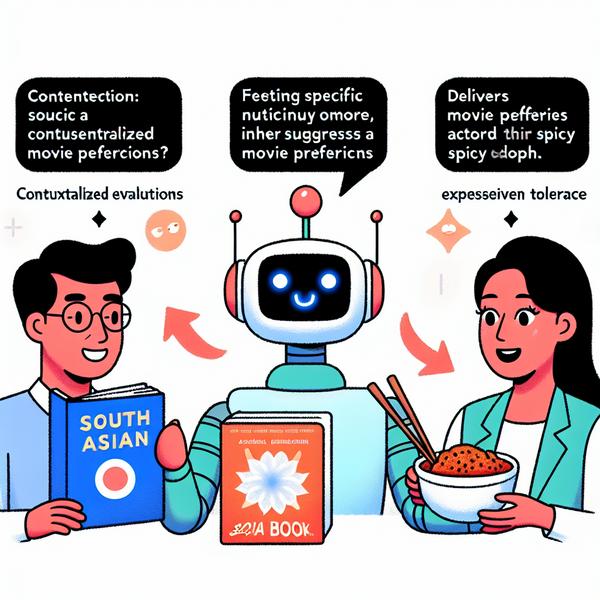
Language models are evolving rapidly, but they often face challenges when interpreting user queries that lack proper context. Imagine asking a model, "How do antibiotics work?"—without knowing your level of knowledge, its response might miss the mark. Researchers from the University of Pennsylvania, the Allen Institute for AI, and others have introduced "contextualized evaluations" as a new method to improve how models are assessed. By adding detailed follow-up question-answer pairs, they aim to overcome biases, like leaning on Western-centric assumptions, and ensure responses are more useful. Let's dive deep into how adding context can pave the way for fairer and more accurate AI evaluations.
Understanding the Need for Context in AI Evaluations
- Language models like ChatGPT or GPT-4 often encounter vague queries, such as "What should I watch?" or "Tell me about history." Without knowing more about the user, like their interests or comprehension level, the answer becomes a wild guess. For example, recommending "The Godfather" to a kid obsessed with animated movies seems off, doesn’t it?
- This is where "context" becomes critical. Think of it like ordering food in a restaurant—if you don't share your spice tolerance, the chef might give you extra chili just because it’s popular!
- Traditional AI benchmarks often miss this nuance, judging models based on style or grammar while ignoring relevance or accuracy for the user. This gap can lead to dissatisfaction or even misconceptions if users rely heavily on such models for guidance.
- Moreover, ignoring context risks amplifying biases in AI outputs, making evaluations inconsistent. For example, a model trained in predominantly Western datasets might rate answers higher when they align with Western norms over non-Western cultural nuances.
The Science Behind Contextualized Evaluations
- Researchers developed a new strategy called "contextualized evaluations," which involves enriching vague queries with synthetic follow-up question-answer pairs. Picture this: A general question like "What is climate change?" paired with clarifications like "I’m a high school student curious about global warming."
- Once these enriched questions are ready, responses from different AI models are tested to see how they adapt. This way, both human and model evaluators can re-assess answers based not just on tone or structure but on personalized clarity, helpfulness, and accuracy.
- For example, evaluations showed that without added context, GPT-4 and Gemini-1.5-Flash might tie in performance. But when context was introduced—like knowing one user is an expert biologist and another is an 8th-grade student—GPT-4 excelled in tailoring answers.
- This approach improved evaluator agreement by leaps—up to 10% more consensus. It also peeled back biases where models might otherwise default to generalized, overly formal Western outputs, which might not resonate with diverse audiences worldwide.
AI's Defaulting to WEIRD Biases
- WEIRD stands for "Western, Educated, Industrialized, Rich, Democratic"—basically the default lens of most training datasets. This bias shows up when models assume a single, global norm while composing answers.
- Picture asking, "What should I cook tonight?" If the model assumes you use an oven or specific imported ingredients common in a Western context, that could alienate cultures that rely on local cooking methods.
- The researchers found that default answers from these models often leaned towards Western-friendly viewpoints or formal tones, making them less dynamic for diverse global users. Contextual prompts can act as a translator, ensuring culturally appropriate and relevant suggestions.
- For instance, instead of recommending Shepherd's Pie for dinner, context-rich systems might suggest nutrient-packed recipes that are specific to the user's region or dietary habits. It’s like AI becoming a homegrown, culturally-aware guidebook instead of a one-size-fits-all cookbook.
Reversing the Rankings: A Game Changer
- The innovative evaluations not only fine-tune AI's responses but sometimes entirely reverse model rankings! Without added context, judges ranked both GPT-4 and Gemini alike. But once context enriched the scenarios, GPT-4 seemed a remarkable fit for diverse, global queries.
- It highlights an important shift: Without such enriched evaluation, AI models’ performance might remain trapped in superficial judgments, emphasizing language fluency over practical accuracy or cultural fit.
- This evolving landscape opens opportunities for AI developers to focus more on smaller, meaningful personalized traits rather than mass-appeal answer bots. It bridges gaps between experts and laypeople alike.
- Imagine an online AI course where a student-specific adaptive AI tutor accurately tailors every teaching demo, making lessons more digestible and less generic.
What Lies Ahead for AI Benchmarks
- Tools like the ContextEval project, now open-sourced, set the foundation for better AI. By encouraging developers to enrich query datasets with relevant context types, models are tested under conditions that simulate real-world ambiguity.
- However, researchers recognize there’s still room to grow. The kinds of contexts added during these evaluations were limited—what happens when cultural or emotional nuances also come into play? Think of life-coaching algorithms that understand your goals better than just offering generic advice.
- Developments like these emphasize building more inclusive datasets. It ensures a fairer playground for emerging multilingual or culturally adaptive AI systems that don’t conform only to dominant trends like English-first biases.
- The conclusion is eye-opening: Context-driven models are not a luxury—they’re a necessity if we all want AI to truly work for everyone. From students in India needing clarity on physics concepts to a retiree in France figuring out smartphones, context-rich AI can be the lighthouse guiding each unique journey!